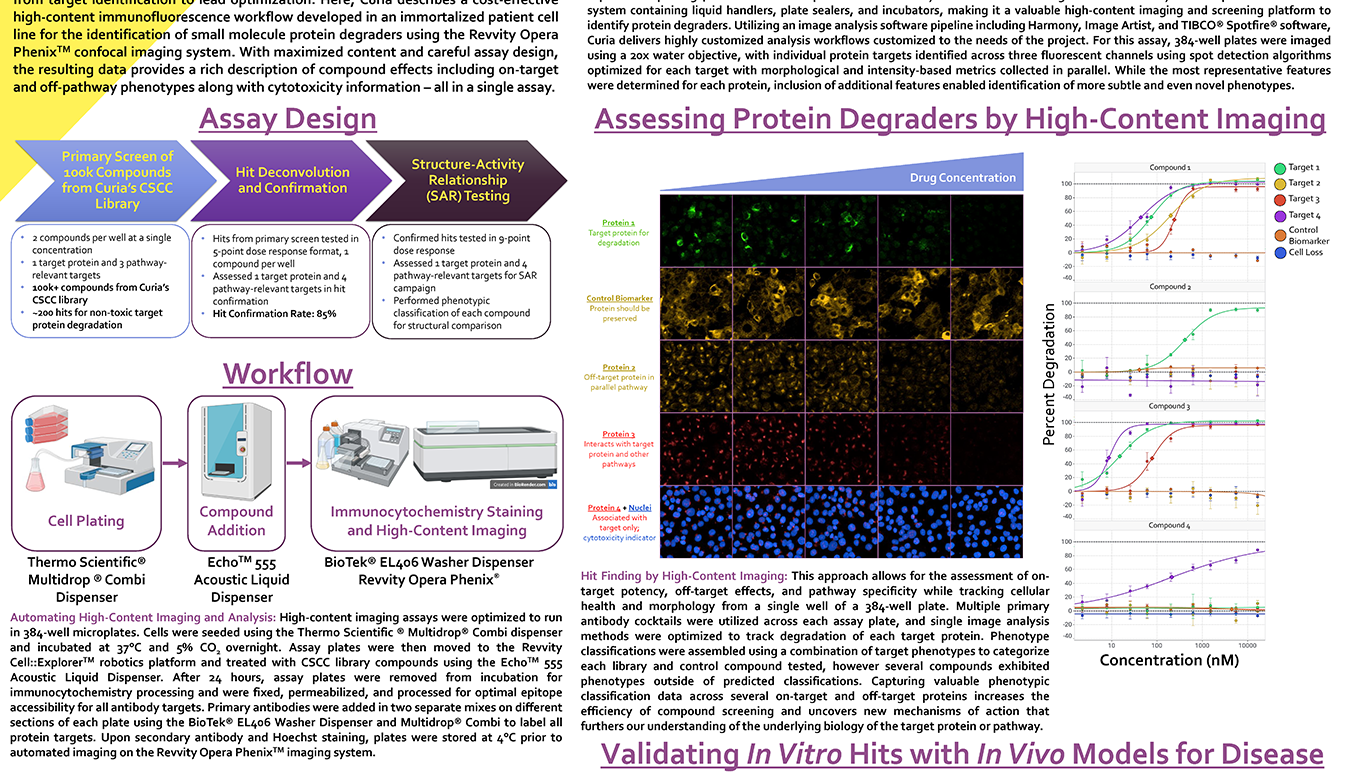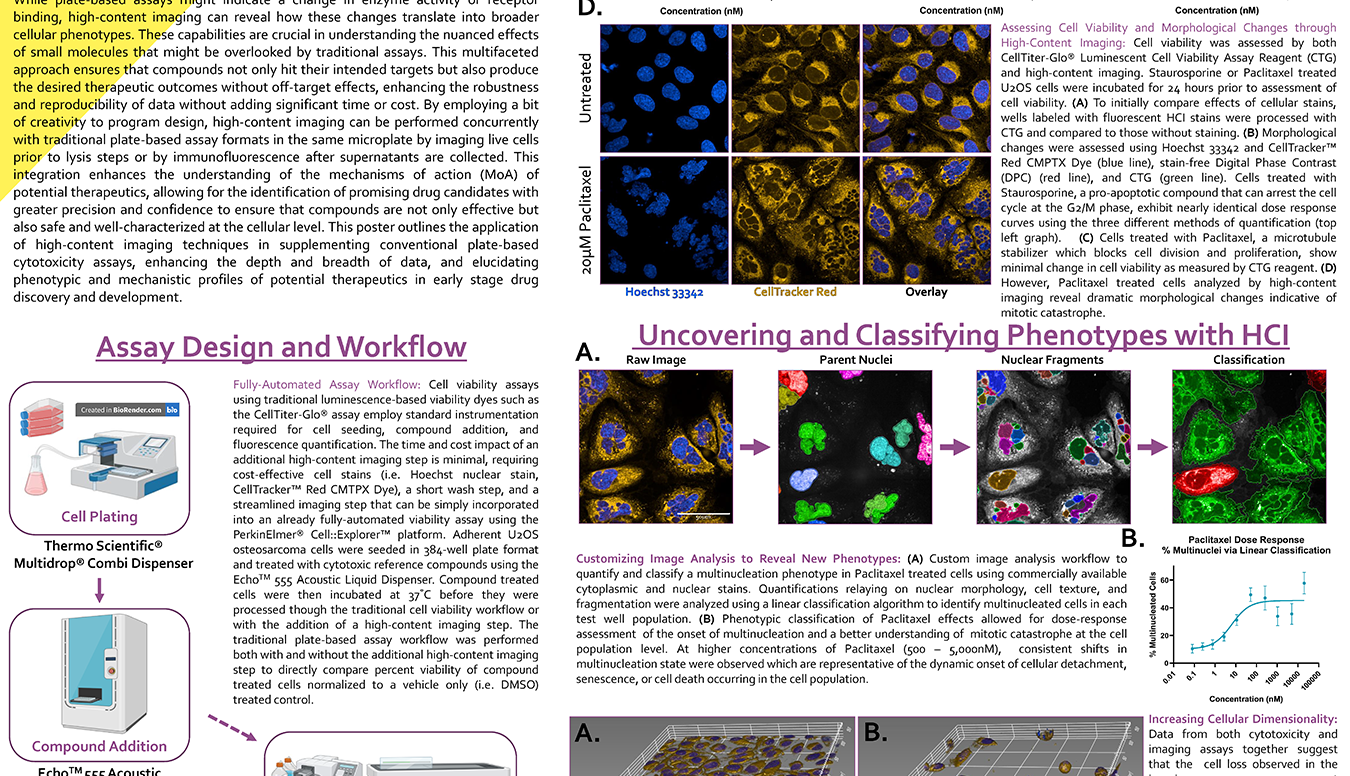Cellular-based Assay Development and Testing
Enhancing Drug Discovery
Evaluating small and large molecule therapeutics within cellular environments is essential to understanding their efficacy, potency, and safety within a complex biological system. This process requires diverse, cell-based assay technologies — from phenotypic screening using high-content imaging to cell viability assessment through luminescence-based-assays.
Curia offers tailored assay development and screening solutions to support projects across the drug discovery pipeline. With advanced technologies such as high-content confocal microscopy (Revvity Opera Phenix™ and Phenix Plus™) and multiplexed protein quantification (Luminex™, Meso Scale Discovery™, FACS™), we employ both innovative and established methodologies to generate comprehensive data that helps move your drug discovery program forward. Using state of the art instrumentation, our team develops practical, predictive, and physiologically relevant assays to meet the unique needs of each discovery program, driving more informed and impactful results.
Cell-based assays are crucial across various stages of drug discovery, from initial screening and hit identification to lead optimization and safety assessments. They allow for the evaluation of diverse parameters, including:
Phenotypic Changes: Monitoring changes in cellular morphology, behavior, or function upon treatment.
Cell Viability and Cytotoxicity: Measuring the impact of compounds on cell survival.
Protein Expression and Pathway Analysis: Assessing the activation or inhibition of key signaling pathways.
Curia’s Stare-of-the-Art Cell-Based Assay Technologies
Cell-based assay technologies involve using live cells to study the biological effects of small molecules, biologics, or other therapeutic candidates. By replicating in vivo conditions, these assays provide more predictive insights into how a drug will behave in a real biological system compared to traditional biochemical assays.
These assays are crucial across various stages of drug discovery, from initial screening and hit identification to lead optimization and safety assessments. Cellular-based assays can evaluate diverse parameters, such as:
- Phenotypic changes: Monitoring changes in cellular morphology, behavior, or function upon treatment.
- Cell viability and cytotoxicity: Measuring the impact of compounds on cell survival.
- Protein expression and pathway analysis: Assessing the activation or inhibition of key signaling pathways.
Curia’s State-of-the-Art Cellular Assay Technologies
At Curia, we leverage advanced cellular assay platforms to deliver accurate, reproducible data that supports drug discovery programs. Our cutting-edge technologies include:
Custom Biomarker Assay Development and Small Molecule Screening in immortalized and human primary cells by:
- AlphaLISA®
- High-Throughput ELISA
- HTRF®
- Flow Cytometry
- Multiplexed Cytokine Quantification (Meso Scale Discovery™ (MSD) S600 Platform)
- Multiplexed Protein/DNA/RNA Panels (Luminex FlexMap3D™ Platform)
Hit Finding by High-Content Imaging and Analysis
- Cell Painting services using the Revvity Opera Phenix™ and Phenix Plus™ confocal imaging systems with machine-learning and AI analysis.
- Multiplexed Phenotypic Profiling
- Screening of Targeted Protein Degraders
- Apoptosis
- Cytotoxicity
- Cell Membrane Permeability
- Histone Modification
- Neurotoxicity
- Large Molecule Internalization and ADCP
- Custom Imagine Readouts
- Cell Cycle Arrest
Large Molecule Therapeutics Testing
- Assay development and testing services using both primary cells and physiologically relevant immortalized cellular systems
- Antibody-Dependent Cellular Cytotoxicity (ADCC)
- Antibody-Dependent Cellular Phagocytosis (ADCP)
- Complement-Dependent Cytotoxicity (CDC)
- T-Cell Dependent Cellular Cytotoxicity (TDCC)
- Antibody Drug Conjugate (ADC) Testing
Lentivirus Production & Cell Line Engineering
- Vector Design & Generation
- Stable Pool Characterization
- Single-Cell Clonal Isolation and Validation by FACS™
- Large-Scale Research Cell Bank and Cell-Paste Generation
- Isolation and Propagation of Cells from Clinical Samples
Bioassay Potency Testing
- Luminescence and fluorescence-based readouts of compound potency, cell proliferation, and biological activity using fully-automated liquid handling platforms.
2D and 3D Cell Culture
- Cellular co-culture systems using 96-well, 384-well, and 1536-well assay plate formats.

